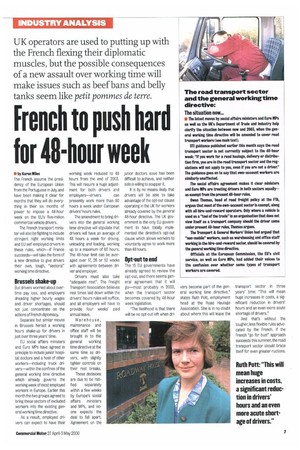French to push hard for 48-hour week
Page 9

If you've noticed an error in this article please click here to report it so we can fix it.
• by Karen Mlles The French assume the presidency of the European Union from the Portuguese in July, and have been making it clear for months that they will do everything in their six months of power to impose a 48-hour week on the EU's five-minion commercial vehicle drivers.
The French transport minister will also be fighting to include stringent night working limits and EU self-employed drivers in these rules, which—if France succeeds—will take the form of a new directive to give drivers their own, tough, "sectoral" working time directive.
Brussels shake-up
But drivers worried about overtime pay loss, and employers dreading higher hourly wages and driver shortages, should not just concentrate on the actions of French diplomacy Separate but similar moves in Brussels herald a working hours shake-up for drivers in just over three years' time.
EU social affairs ministers and Euro MPs have agreed in principle to include junior hospital doctors and a host of other workers—including truck drivers—within the confines of the general working time directive which already governs the working week of most employed workers in Europe. Earlier this month the two groups agreed to bring these sectors of excluded workers into the existing general working time directive.
As a result, employed drivers can expect to have their working week reduced to 48 hours from the end of 2003. This will require a huge adjustment for both drivers and employers—drivers can presently work more than 80 hours a week under European drivers' hours rules.
The amendment to bring drivers into the general working time directive will stipulate that drivers will have an average of 48 hours a week for driving, unloading and loading, working up to a maximum of 60 hours. The 48-hour limit can be averaged over 17, 26 or 52 weeks with agreements between driver and employer.
Drivers must also take "adequate rest". The Freight Transport Association believes rest times laid down within the drivers' hours rules will suffice, and all employers will have to provide four weeks' paid annual leave.
Warehouse, maintenance and office staff will be brought in to the general working time directive at the same time as drivers, with slightly tighter controls on their rest breaks.
These decisions are due to be rati fied separately within a Few weeks by Europe's social affairs ministers and MPs, and noone expects the deal to fall apart. Agreement on the junior doctors issue has been difficult to achieve, and neither side is willing to scupper d.
It is by no means likely that drivers will be able to take advantage of the opt-out clause operating in the UK for workers already covered by the general 48-hour directive. The UK government is the only EU government to have totally implemented the directive's opt-out clause which allows workers to voluntarily agree to work more than 48 hours.
Opt-out to end
The 15 EU governments have already agreed to review the opt-out, and there seems general agreement that it will go—most probably in 2003, when the transport sector becomes covered by 48-hour week legislation.
"The likelihood is that there will be no opt-out left when dri vers become part of the general working time directive," states Ruth Poll, employment head at the Road Haulage Association. She is in no doubt about where this will leave the
transport sector in three years' time: "This will mean huge increases in costs, a significant reduction in drivers' hours and an even more acute shortage of drivers."
And that's without the tougher, less flexible rules advocated by the French. If the French "go for bust" approach succeeds this summer, the road transport sector should brace itself for even greater ructions.








































































































